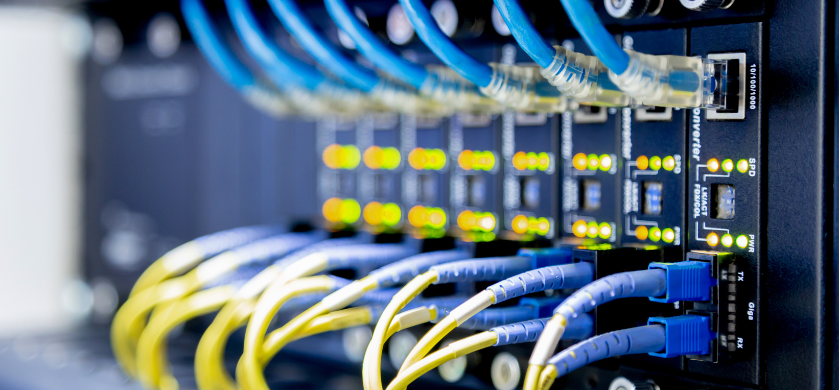Designing Stadium WiFi to Support Smart Stadium Advancements
Providing WiFi at a sporting event is no longer a luxury; today, smart stadiums are defined by their access to the internet and the unique experiences that connectivity provides to guests. For stadiums to excel with modern consumers, they need to leverage smart WiFi designs, built by professional technicians.
When considering upgrading your stadium WiFi system, it is important to explore not only the technical solutions to providing stronger connectivity to fans, but also how to leverage that connectivity to drive positive experiences and increased revenue.
Why Do Stadiums Need to Prioritize WiFi Design for Responsive WiFi?

Gone are the days where fans go to stadiums just to watch a game — today, fans crave a holistic experience when they pay a premium to watch their team live. Whether in baseball parks, basketball arenas, or football stadiums, fans expect far more than a live sporting event; WiFi is intrinsically linked to these new experiences.
Here are just a few of the advancements stadium fans expect with their ticket — and why responsive WiFi design is essential to each.
Better Organic Advertising Through Fan Social Media Engagement
Social media engagement has risen as an essential way for businesses to gain free, organic marketing. Through strategies such as hashtag campaigns, photo opportunities, and community management, brands can encourage and spur interaction with social media users, leading to higher views on posts and potential conversions into customers.
Encouraging social media engagement is vital for stadiums. With effective marketing, stadiums can leverage QR code implementation, sharing online polls about game events, and even the potential to be featured on a stadium screen to get fans talking online.
Of course, for fans to access social media in stadiums, venues need to ensure access to a responsive, reliable WiFi network. Without thoughtful stadium WiFi design, fans won’t be able to access social media; even with solid in-stadium marketing, fans will grow frustrated at their lack of ability to participate in campaigns. This leads to a decrease in fans participating in organic marketing, which may cost sponsored businesses the potential of new customers. In turn, responsive WiFi needs to be a priority.
Improved Stadium Experience Across Consumer Demographics Using Football Fan Apps
For modern stadiums, fan experiences are intrinsically linked to IoT. Through football stadium fan apps, venues can streamline access to tickets, can help attendees order food, let hardcore fans check scores around the league, and more. Creating an integrated environment within the stadium can allow for a more positive fan experience as well as bolster points of sale throughout the venue, potentially driving greater revenue. These app features provide technological advancements that range from quality-of-life improvements to fundamental changes in how fans view the game — offering impressive utility to casual and die-hard attendees alike.
Again, a stable network connection is essential to accessing these smart stadium capabilities. Skillful stadium WiFi design makes all of these features easily accessible, turning them from superfluous benefits to integral parts of the stadium experience. Plus, as fans turn to social media to showcase their immersive new experiences in real-time, your venue gains even more productive social media engagement.
How to Design WiFi Coverage for Stadiums & Arenas

With so much of the modern stadium experience relying on internet connection, it is clear why skillful WiFi network design is essential to stadiums. Typical mobile carriers are not sufficient enough to handle the data demand of a high-volume event. How, then, can stadiums and arenas design WiFi coverage to extend reliably throughout a stadium?
To ensure effective coverage, venues should consult the experts. Using a team specialized in smart stadium technology, stadiums can leave design to highly-skilled, experienced technicians who know how to circumvent typical pain points. Here are some of the strategies knowledgeable technicians will use when designing stadium WiFi.
Leverage the Appropriate Bandwidth
Bandwidth is key to providing consistent, reliable WiFi access in stadiums and arenas. Referring to the maximum amount of data transmitted over an internet connection in a given amount of time, outdated stadium networks are often overloaded by users due to low bandwidth. Without the bandwidth to support enough users, networks slow down, and occasionally stop working altogether.
A skilled WiFi technician can calculate the exact bandwidth needs of a venue based on venue size and maximum capacity. Needs will vary depending on the scale of your stadium or arena — experts can determine exactly what is necessary and generate a solution customized to your venue’s needs.
Locate Dead Spots Throughout the Venue
WiFi signals rely on transmitting invisible connective waves across space; in turn, they need the space to actually transmit and reach devices. Dead zones, or areas in a venue that a WiFi signal doesn’t reach, occur when that space is obstructed or extended beyond what a signal can handle. These can occur due to obstacles like thick walls, bulky metal furniture, and high distance between WiFi access points.
It can be quite simple to locate WiFi dead zones; what’s harder is fixing them. Whether manually or using software, a WiFi expert can pinpoint where WiFi cuts out and determine how to fix it; potential solutions include moving an obstruction, moving an access point, or installing an additional access point to ensure reliable coverage.
Invest in Proper Network Security Measures
Sometimes, even with appropriate bandwidth and minimized dead spots, networks can experience slowdown. These issues can often be traced back to security breaches. Bad actors know stadiums are ripe locations for public WiFi access — whether for their own personal WiFi use or stealing user data, stadiums need to protect themselves from these users.
There are several techniques stadiums can use to increase network security. Networks can leverage captive portals, landing pages displayed to new users within a network requesting information such as name or ticket number, to keep unwanted users out. Stadiums can also implement content filters, restricting access to websites with questionable security.
Hospitality Network: The Clear Choice for Implementing Stadium WiFi Design
Efficient WiFi network design is absolutely essential to modern stadiums. From social media engagement to online concessions, so many of the features fans crave hinge on a strong internet connection within the venue itself.
Looking to optimize the WiFi design in your stadium or arena? Hospitality Network is a leading provider of smart stadium solutions. Our team has handled some of the largest football stadiums in the country — experienced at bringing thorough WiFi design to venues of all shapes and sizes, from installation to management. Contact us today and learn how we can help innovate your stadium.

